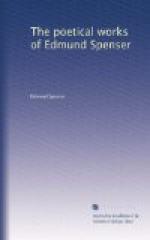“And ye, poore Pilgrims! that with restlesse
toyle
Wearie your selves in wandring desart wayes,
Till that you come where ye your vowes assoyle*,
535
When passing by ye reade these wofull layes
On my grave written, rue my Daphnes wrong,
And mourne for me that languish out my dayes.
Cease, Shepheard! cease, and end thy undersong.”
[* Assoyle, absolve, pay.]
Thus when he ended had his heavie plaint,
540
The heaviest plaint that ever I heard sound,
His cheekes wext pale, and sprights began to faint,
As if againe he would have fallen to ground;
Which when I saw, I, stepping to him light,
Amooved* him out of his stonie swound,
545
And gan him to recomfort as I might.
[* Amooved, roused.]
But he no waie recomforted would be,
Nor suffer solace to approach him nie,
But, casting up a sdeinfull eie at me,
That in his traunce I would not let him lie,
550
Did rend his haire, and beat his blubbred face,
As one disposed wilfullie to die,
That I sore griev’d to see his wretched case.
Tho when the pang was somewhat overpast,
And the outragious passion nigh appeased,
555
I him desyrde, sith daie was overcast
And darke night fast approched, to be pleased
To turne aside unto my cabinet*,
And staie with me, till he were better eased
Of that strong stownd** which him so sore beset.
560
[* Cabinet, cabin.]
[** Stownd, mood, parosysm of grief.]
But by no meanes I could him win thereto,
Ne longer him intreate with me to staie,
But without taking leave he foorth did goe
With staggring pace and dismall looks dismay,
As if that Death he in the face had seene,
565
Or hellish hags had met upon the way:
But what of him became I cannot weene.
* * * * *
AMORETTI
AND
EPITHALAMION.
WRITTEN NOT LONG SINCE BY
EDMUNDE SPENSER.
* * * * *
PRINTED FOR WILLIAM POSBONBY.
1595.
G. W. SENIOR*,
TO THE AUTHOR.
[* These commendatory Sonnets first appeared in the
first folio edition
of Spenser’s entire works (1611). G. W.,
as Todd conjectures, may be
George Whetstone. C.]
Darke is the day when Phoebus face is shrowded,
And weaker sights may wander soone astray;
But when they see his glorious raies unclowded,
With steddy steps they keepe the perfect way:
So, while this Muse in forraine land doth stay,
Invention weepes, and pennes are cast aside;
The time, like night, deprivd of chearfull day;
And few doe write, but ah! too soone may slide.
Then his thee home, that art our perfect guide,
And with thy wit illustrate Englands fame,
Daunting therby our neighbors ancient pride,
That do for Poesie challenge chiefest name:




